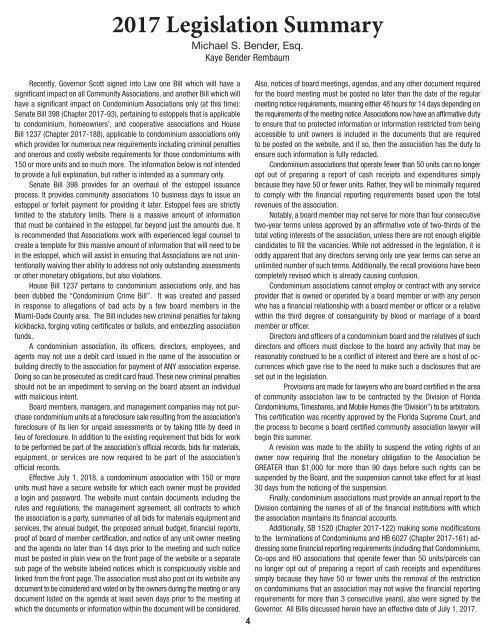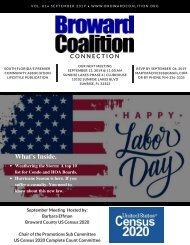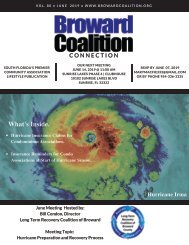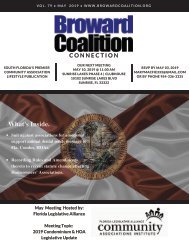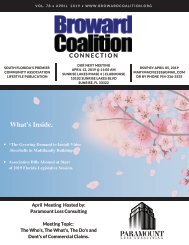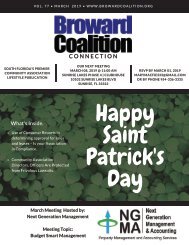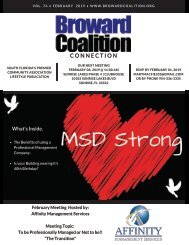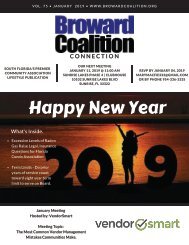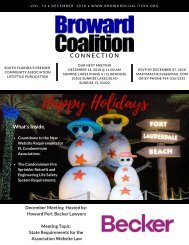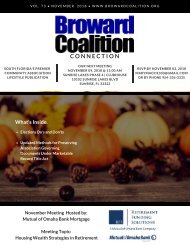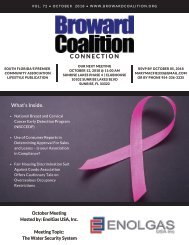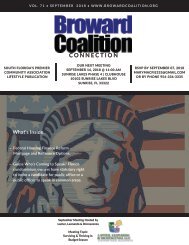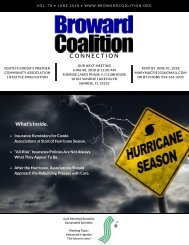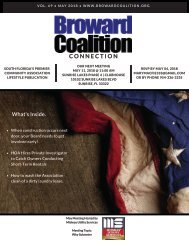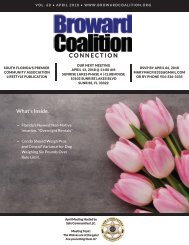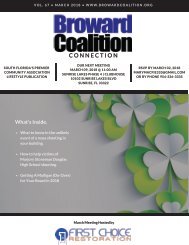September 2017 Newsletter
You also want an ePaper? Increase the reach of your titles
YUMPU automatically turns print PDFs into web optimized ePapers that Google loves.
<strong>2017</strong> Legislation Summary<br />
Michael S. Bender, Esq.<br />
Kaye Bender Rembaum<br />
Recently, Governor Scott signed into Law one Bill which will have a<br />
significant impact on all Community Associations, and another Bill which will<br />
have a significant impact on Condominium Associations only (at this time):<br />
Senate Bill 398 (Chapter <strong>2017</strong>-93), pertaining to estoppels that is applicable<br />
to condominium, homeowners’, and cooperative associations and House<br />
Bill 1237 (Chapter <strong>2017</strong>-188), applicable to condominium associations only<br />
which provides for numerous new requirements including criminal penalties<br />
and onerous and costly website requirements for those condominiums with<br />
150 or more units and so much more. The information below is not intended<br />
to provide a full explanation, but rather is intended as a summary only.<br />
Senate Bill 398 provides for an overhaul of the estoppel issuance<br />
process. It provides community associations 10 business days to issue an<br />
estoppel or forfeit payment for providing it later. Estoppel fees are strictly<br />
limited to the statutory limits. There is a massive amount of information<br />
that must be contained in the estoppel, far beyond just the amounts due. It<br />
is recommended that Associations work with experienced legal counsel to<br />
create a template for this massive amount of information that will need to be<br />
in the estoppel, which will assist in ensuring that Associations are not unintentionally<br />
waiving their ability to address not only outstanding assessments<br />
or other monetary obligations, but also violations.<br />
House Bill 1237 pertains to condominium associations only, and has<br />
been dubbed the “Condominium Crime Bill”. It was created and passed<br />
in response to allegations of bad acts by a few board members in the<br />
Miami-Dade County area. The Bill includes new criminal penalties for taking<br />
kickbacks, forging voting certificates or ballots, and embezzling association<br />
funds.<br />
A condominium association, its officers, directors, employees, and<br />
agents may not use a debit card issued in the name of the association or<br />
building directly to the association for payment of ANY association expense.<br />
Doing so can be prosecuted as credit card fraud. These new criminal penalties<br />
should not be an impediment to serving on the board absent an individual<br />
with malicious intent.<br />
Board members, managers, and management companies may not purchase<br />
condominium units at a foreclosure sale resulting from the association’s<br />
foreclosure of its lien for unpaid assessments or by taking title by deed in<br />
lieu of foreclosure. In addition to the existing requirement that bids for work<br />
to be performed be part of the association’s official records, bids for materials,<br />
equipment, or services are now required to be part of the association’s<br />
official records.<br />
Effective July 1, 2018, a condominium association with 150 or more<br />
units must have a secure website for which each owner must be provided<br />
a login and password. The website must contain documents including the<br />
rules and regulations, the management agreement, all contracts to which<br />
the association is a party, summaries of all bids for materials equipment and<br />
services, the annual budget, the proposed annual budget, financial reports,<br />
proof of board of member certification, and notice of any unit owner meeting<br />
and the agenda no later than 14 days prior to the meeting and such notice<br />
must be posted in plain view on the front page of the website or a separate<br />
sub page of the website labeled notices which is conspicuously visible and<br />
linked from the front page. The association must also post on its website any<br />
document to be considered and voted on by the owners during the meeting or any<br />
document listed on the agenda at least seven days prior to the meeting at<br />
which the documents or information within the document will be considered.<br />
4<br />
Also, notices of board meetings, agendas, and any other document required<br />
for the board meeting must be posted no later than the date of the regular<br />
meeting notice requirements, meaning either 48 hours for 14 days depending on<br />
the requirements of the meeting notice. Associations now have an affirmative duty<br />
to ensure that no protected information or information restricted from being<br />
accessible to unit owners is included in the documents that are required<br />
to be posted on the website, and if so, then the association has the duty to<br />
ensure such information is fully redacted.<br />
Condominium associations that operate fewer than 50 units can no longer<br />
opt out of preparing a report of cash receipts and expenditures simply<br />
because they have 50 or fewer units. Rather, they will be minimally required<br />
to comply with the financial reporting requirements based upon the total<br />
revenues of the association.<br />
Notably, a board member may not serve for more than four consecutive<br />
two-year terms unless approved by an affirmative vote of two-thirds of the<br />
total voting interests of the association, unless there are not enough eligible<br />
candidates to fill the vacancies. While not addressed in the legislation, it is<br />
oddly apparent that any directors serving only one year terms can serve an<br />
unlimited number of such terms. Additionally, the recall provisions have been<br />
completely revised which is already causing confusion.<br />
Condominium associations cannot employ or contract with any service<br />
provider that is owned or operated by a board member or with any person<br />
who has a financial relationship with a board member or officer or a relative<br />
within the third degree of consanguinity by blood or marriage of a board<br />
member or officer.<br />
Directors and officers of a condominium board and the relatives of such<br />
directors and officers must disclose to the board any activity that may be<br />
reasonably construed to be a conflict of interest and there are a host of occurrences<br />
which gave rise to the need to make such a disclosures that are<br />
set out in the legislation.<br />
Provisions are made for lawyers who are board certified in the area<br />
of community association law to be contracted by the Division of Florida<br />
Condominiums, Timeshares, and Mobile Homes (the ‘Division”) to be arbitrators.<br />
This certification was recently approved by the Florida Supreme Court, and<br />
the process to become a board certified community association lawyer will<br />
begin this summer.<br />
A revision was made to the ability to suspend the voting rights of an<br />
owner now requiring that the monetary obligation to the Association be<br />
GREATER than $1,000 for more than 90 days before such rights can be<br />
suspended by the Board, and the suspension cannot take effect for at least<br />
30 days from the noticing of the suspension.<br />
Finally, condominium associations must provide an annual report to the<br />
Division containing the names of all of the financial institutions with which<br />
the association maintains its financial accounts.<br />
Additionally, SB 1520 (Chapter <strong>2017</strong>-122) making some modifications<br />
to the terminations of Condominiums and HB 6027 (Chapter <strong>2017</strong>-161) addressing<br />
some financial reporting requirements (including that Condominiums,<br />
Co-ops and HO associations that operate fewer than 50 units/parcels can<br />
no longer opt out of preparing a report of cash receipts and expenditures<br />
simply because they have 50 or fewer units the removal of the restriction<br />
on condominiums that an association may not waive the financial reporting<br />
requirements for more than 3 consecutive years), also were signed by the<br />
Governor. All Bills discussed herein have an effective date of July 1, <strong>2017</strong>.


